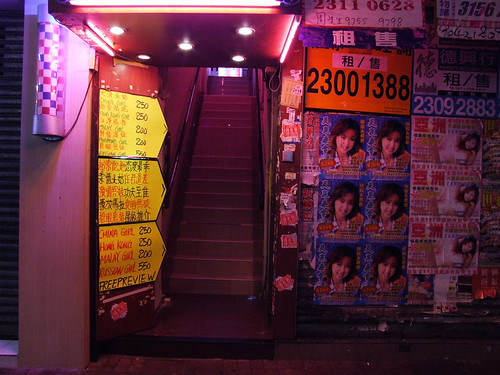Read my update (2009-11-03): What will $200 in fact still get you on Shanghai Street?
Brothels in Hong Kong are pretty obvious, even to the untrained eye. In 2002, on my first trip to Hong Kong, I was told by relatives to well differentiate between karaoke bars and music boxes (the latter being the one that you go to with family and young children). In 2005, when I decided to walk on my own in the streets of Hong Kong, I finally realized that they might just be part of the background, almost as if it were just any other “service”.
My friends Chris and Laine are apparently having a great time in Hong Kong, eating well, wandering in a lot of places. Yesterday, Chris posted a pair of articles on Urbanphoto, including a piece on the brothel area on Shanghai Street, around Yau Ma Tei and Jordan:
Shanghai Street is one of those long, straight Kowloon roads that seem to change character every few blocks. In the south, near Jordan Road, are grocery stores and restaurants, along with a handful of shops catering to Nepalese, Indian and Pakistani immigrants. In the north, past Argyle Street, home furnishing stores predominate. The red light district falls somewhere in between.
For the most part, brothels in Yau Ma Tei and Mongkok are coyly disguised as “karaoke bars,” their real vocation indicated by the pretty, busty girls on their signs, often accompanied by a price. On Shanghai Street, though, the sex trade is as blatant as it gets in Hong Kong, with hookers waiting on the sidewalk and brothels that do away with all pretense of offering karaoke and instead unabashedly advertise their real wares. Here, racism and sexism come together in cardboard signs posted at the entrances to old walkup apartment buildings: “China Girl 250; Hong Kong Girl 250; Malay Girl 200; Russian Girl 550; Free Preview.”
It’s a bit of a shock to see these signs displayed so openly, especially since most aspects of prostitution, including the operation of a brothel, are illegal in Hong Kong. It is hard not to read into them a mirror of the more unsavoury side of Hong Kong society, one that is often shameless in its contempt for the 300,000 Filipina and Indonesian domestic helpers that live and work in the territory.
Yesterday, on the bus, my girlfriend overhead a couple ranting about the gall their helper had in asking for time off to visit her sick mother in the Philippines. “What, does she think that she’ll get better if she goes to visit?” one of them said, before complaining about her eating habits. “Some of those damn Filipinas eat so much.” With attitudes like that, is it any surprise that such a low value is placed on women, and in particular Southeast Asian women, on Shanghai Street?
But the red light district on lasts for only a few blocks; it’s easy to walk past and, if you want, easy to forget.
This article was originally posted by Christopher DeWolf on the collaborative blog Urbanphoto, which he runs.

